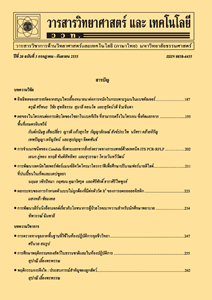Effect of Phenylalanine on Seed Germination and Antioxidants of Sunflower Sprout
Main Article Content
Abstract
Phenylalanine (Phe) is the precursor for the biosynthesis of various secondary metabolites, which has crucial roles in improving plant growth and secondary metabolite production. Therefore, the objective of this research was to investigate the effect of Phe on seed germination, growth and antioxidants of sunflower (Helianthus annuus L.) sprouts. Soaking seeds in 0, 100, 200, 400, 600 and 800 mg/L Phe for 8 hours resulted in non-significantly different of seed germination percentage. However, sunflower seeds germinated earlier under 400 mg/L Phe, which showed the highest first count of germination and the lowest mean time to germination. Phe concentrations of 100, 200 and 400 mg/L were sprayed at 4 days after sowing and sprouts were harvested at 5 days after sowing. Results indicated that sprayed Phe treatments promoted the growth of sprout as shoot height, fresh and dry weight of these treatments exhibited significantly higher than those of non-sprayed treatment. The highest total phenolic content and the best DPPH radical scavenging capacity were obtained under 400 mg/L Phe. Total flavonoid content was not statically different among sprayed and non-sprayed Phe treatments.
Article Details
References
Cevallos-Casals, B.A and Cisneros-Zevallos, L., 2010, Impact of germination on phenolic content and antioxidant activity of 13 edible seed species, Food Chem. 119: 1485-1490.
Pajạk, P., Socha, R., Gałkowska, D., Rožnowski, J. and Fortuna, T., 2014, Phenolic profile and antioxidant activity in selected seeds and sprouts, Food Chem. 143: 300-306.
El-Din, K.M.G. and El-Wahed, M.S.A.A., 2005, Effect of some amino acids on growth and essential oil content of chamomile plant, Int. J. Agri. Biol. 7: 376-380.
Talaat, I.M., Khattab, H.I. and Ahmed, A.M., 2014, Changes in growth, hormones levels and essential oil content of Ammi visnaga L. plants treated with some bioregulators, Saudi J. Biol. Sci. 21: 355-365.
Seo, J.M., Arasu, M.V., Kim, Y.B., Park, S.U., and Kim, S.J., 2015, Phenylalanine and LED lights enhance phenolic compound production in Tartary buckwheat sprouts, Food Chem. 177: 204-213.
Reham, M.S., Khattab M.E., Ahmed S.S. and Kandil, M.A.M., 2016, Influence of foliar spray with phenylalanine and nickel on growth, yield quality and chemical composition of genoveser basil plant, Afr. J. Agric. Res. 11: 1398-1410.
ISTA, 2008, International Rules for Seed Testing, Edition 2008, The International Seed Testing Association, Bassersdorf.
Geneve, R.L., 2005, Vigor Testing in Flower Seed, pp. 311-322, In McDonald, M.B. and Kwong, F.Y. (Eds.), Flower Seeds Biology and Technology, CABI, Wallingford.
Chumsri, P., Sirichote, A. and Itharat, A., 2008, Studies on the optimum conditions for the extraction and concentration of roselle (Hibiscus sabdariffa Linn.) extract, Songklanakarin J. Sci. Technol. 30: 133-139.
Folin, O. and Ciocalteu, V., 1927, On tyrosine and tryptophane determination in proteins, J. Biol. Chem. 27: 627-650.
Zhu, H., Wang, Y., Liu, Y., Xia, Y. and Tang, T., 2010, Analysis of flavonoids in Portulaca oleracea L. by UV-Vis spectrophotometry with comparative study on different extraction technologies, Food Anal. Methods. 3: 90-97.
Yamasaki, K., Hashimoto A., Kokusenya Y., Miyamoto T. and Sato T., 1994, Electrochemical method for estimating the antioxidative effects of methanol extracts of crude drugs, Chem. Pharm. Bull. 42: 1663-1665.
Copeland, L.O. and McDonald, M.B., 1995, Principle of Seed Science and Technology, Chammam and Hall, London. 409 p.
Treesurn, S. and Junmatong, C., 2017, Effect of salicylic acid soaking on seed germination, growth and antioxidant capacity of sunflower seedlings, Songklanakarin J. Pl. Sci. 4: 36-40. (in Thai).
Hopkins, W.G. and Hüner, N.P.A., 2009, Introduction to Plant Physiology, 4th Ed., John Wiley and Sons, Hoboken, NJ., 503 p.
Koca, N. and Karaman, Ş., 2015, The effects of plant growth regulators and L-phenylalanine on phenolic compounds of sweet basil, Food Chem. 166: 515-521.


